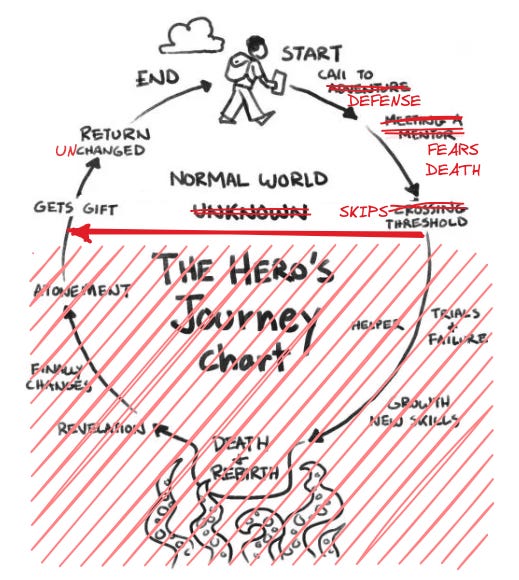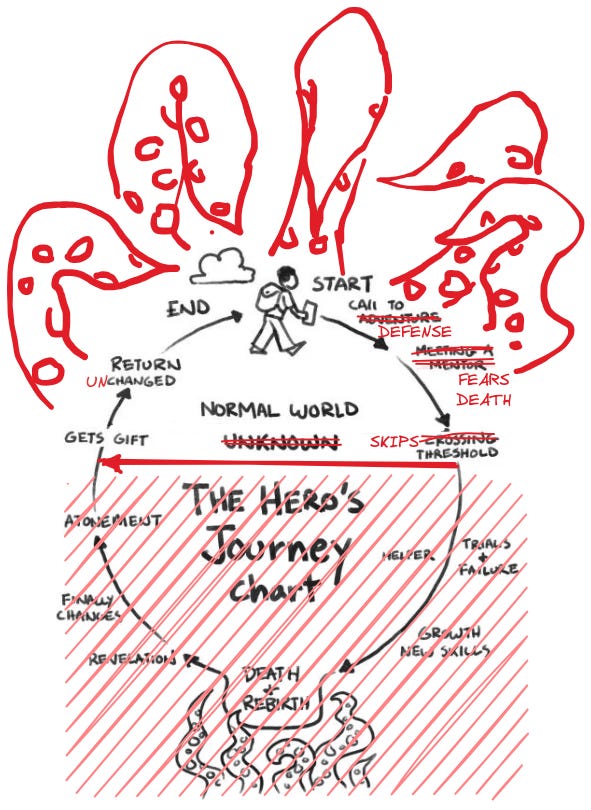Are you really the hero of your story?
Are You Really The Hero Of Your Story?
December 9, 2024 | Individuation | Rob Dinh
The word hero often brings to mind admiration and courage. By definition, a hero is:
a person who is admired or idealized for courage, outstanding achievements, or noble qualities.
In Jungian psychology, the Hero archetype is tied to our dominant function—the part of us that shapes our conscious understanding. As John Beebe explains,
the hero symbolizes what Jung calls the dominant function of consciousness and is thus an image of the cutting edge of the ego. For Jung, “Consciousness needs a centre, an ego to which something is conscious”
Susan Storm expands on this idea:
When it comes to personality type, each of us has a special gift or strength that, if fostered, can be harnessed in an incredible way… This is the function we use when we are “leading the charge” and completely sure of our direction and ability. This is the function we use when we enter a “flow” state and when we feel capable and competent. The hero function is positive, confident, and consciously controlled.
It’s easy to see why this resonates. Who doesn’t want to feel like the hero in their story? But sometimes, we might romanticize this idea a little too much, equating our dominant function with an untouchable superhero. In doing so, we risk losing sight of Jung’s deeper intent.

Being the “hero” isn’t about superpowers or fighting villains—it’s about navigating the complex journey of growing up and coming to terms with who we are. It’s a process everyone experiences, a natural phenomenon rather than an extraordinary event. Life isn’t about reaching a triumphant end; it’s about ongoing growth, a cycle of challenges, failures, and self-discovery. We are always individuating—transforming and evolving through the tension between our conscious self and the unconscious.
Individuation is not a destination. It’s a lifelong journey of reinvention. Each time your ego confronts the unconscious, it changes, dies, and is reborn. Your personal growth is measured by how often you’re willing to undergo this cycle. How “healthy” you are isn’t about avoiding failure but about embracing the process of learning from your challenges.
Of course, letting go of the ego isn’t easy. It gives us a sense of control, stability, and identity. Why risk disrupting that? Why not stick with what works? These are the exact questions the ego uses to defend itself. It creates barriers to avoid what it perceives as threats and clings tightly to the dominant function as its tool for navigating the world. This survival strategy can distort your perspective, making the ego’s view of reality feel like the only truth.

When this happens, the ego may even develop a superiority or inferiority complex to maintain its grip. As Beebe mentions:
The superior function, not surprisingly, is the part of the ego we are most ready to claim ownership of, because it is associated with a sense of competence and potential mastery. The archetype that grants us this confidence in relation to the superior function (around which it is possible to develop a superiority complex) I have named the hero in a man and the heroine in a woman. This is a part of the psyche that welcomes facing challenges, that takes pleasure in recalling its past successful exploits, that revels in its unflagging reliability.
It’s no surprise that stepping away from the ego feels daunting—it often feels like losing a part of ourselves. But to grow, the ego must be challenged.
Joseph Campbell famously described the Hero’s Journey as a universal narrative of transformation. In Jungian terms, this journey mirrors the process of individuation: a repeated cycle of trials, revelations, and self-integration. The unconscious projects itself into our reality, urging us to face challenges and grow. It manifests in crises and conflicts, showing us what we might not want to see about ourselves.

When we feel stuck or unhappy, the unconscious pushes for change. These moments of discomfort are invitations to grow. We might realize that the very struggles we see in others are reflections of our inner conflicts. Perhaps we’re not the heroes we imagined, but instead, our own greatest obstacle. And in that realization, we might also discover who the true hero has been all along.
By reframing the Hero archetype, we can approach individuation with humility and curiosity. It’s not about being perfect or in control; it’s about embracing the messy, ongoing process of becoming more fully ourselves.
Share On: